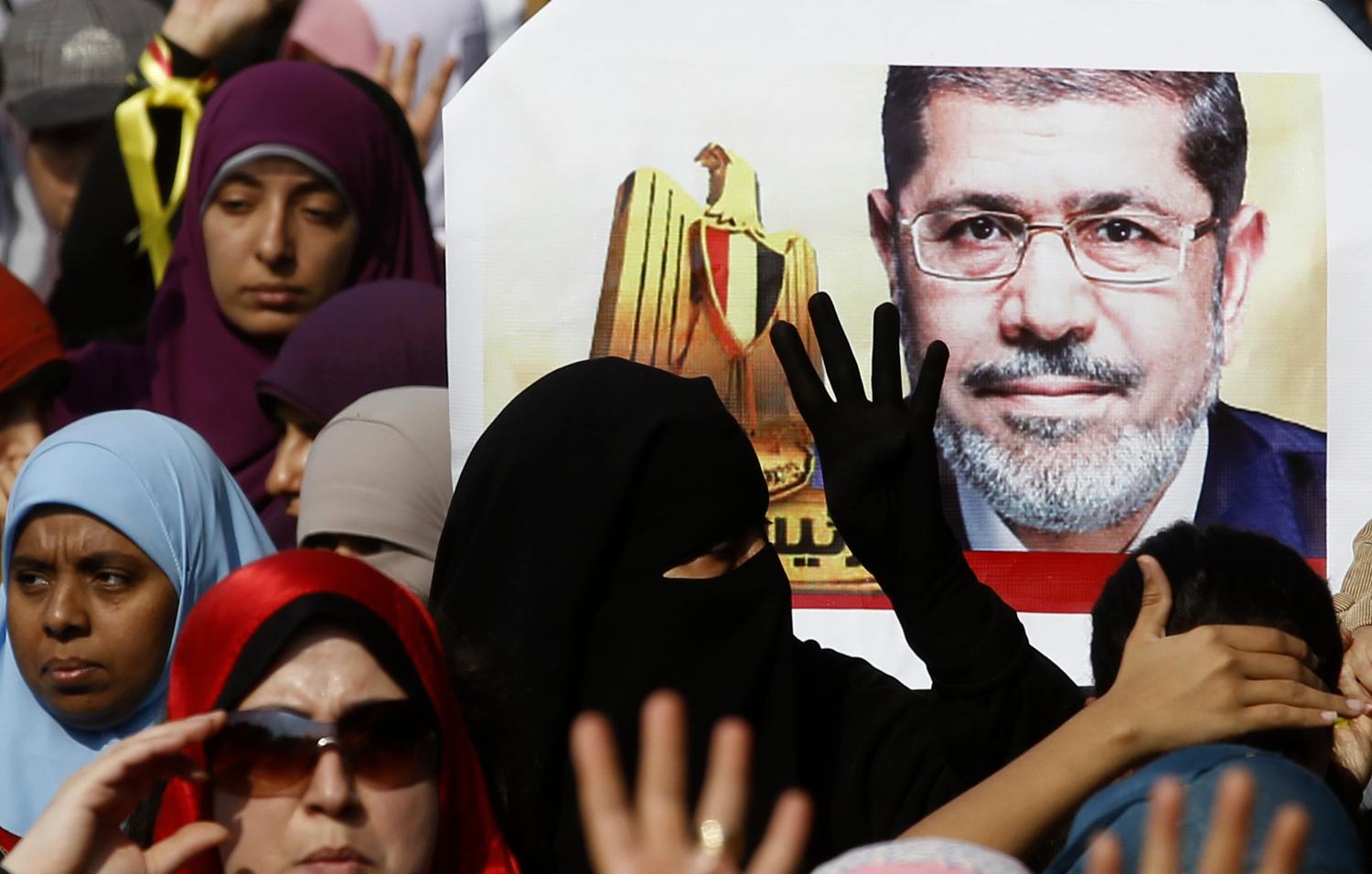By declaring the Muslim Brotherhood a terrorist organization, Egypt risks radicalizing the group’s members and destabilizing the region further. Daniel Byman and Tamara Wittes argue that the Obama administration should engage with peaceful Islamists, push Egypt to allow Brotherhood supporters to participate in legitimate political and social activity, cooperate with Egypt on legitimate terrorism threats and expand counter-radicalization efforts there.
 |
MEMORANDUM TO: President Obama |
Summary and Recommendations
Egypt has long been a U.S. ally, and its stability an important U.S. interest. The military’s forcible removal of Mohammed Morsi and the Muslim Brotherhood-led government in July 2013 and the brutal crackdown that ensued are likely to further destabilize Egypt. The Brotherhood’s exclusion from politics could lead its members to give up on peaceful politics, radicalize and return to terrorism, which would pose a major setback for U.S. interests in Egypt. The negative effects could spill outside of Egypt’s heartland to Sinai and beyond its borders to Gaza, further threatening U.S. interests.
American policy probably cannot prevent the
radicalization of the Brotherhood, but it can seek to mitigate its effects on U.S. interests and the security of Americans. The Egyptian regime is primarily focused right now on securing its hold on power, while our interests are in the overall stability of Egypt and the region. American policy must therefore seek to prevent widescale radicalization, while also limiting the capacity of Islamist radicalism in Egypt to affect regional stability. We recommend that you push the Egyptian government far harder to allow paths for Brotherhood supporters to participate in legitimate political and social activity. You should also broaden intelligence efforts on Islamist radicalization, and focus U.S. engagement with Egypt and other Arab allies on counter-radicalization, as well as counter-terror, operations.
To sustain a peaceful alternative for Brotherhood supporters, you should press the Egyptian government to release from prison Islamist politicians who commit to non-violence, and to allow a range of Islamist parties to organize, compete in elections, and participate in governance. Former President Morsi is now on trial for a host of charges, some questionable, in a highly politicized environment. The United States should not make his release the measure of success for its diplomacy. But it should continue to press the Egyptian government to engage with Brotherhood figures seeking reconciliation, and should insist that Morsi receive fair treatment. U.S. officials should engage with all Egyptian politicians, including Islamists committed to non-violent political participation—even if this displeases the Egyptian government.
The Egyptian government has declared the Brotherhood a terrorist organization, criminalizing membership in the group and association with it. Cairo will likely expect you to accede to this designation, although at this point it is less an empirical description than a self-fulfilling prophecy. You should make clear to your Egyptian counterparts that, absent clear evidence of violent intent and capability, the United States will not allow criminalization of the Brotherhood to bar your officials’ contact with peaceful political opponents.
Background
Last July the Egyptian military forcibly removed from power the elected government of Morsi, a Muslim Brotherhood leader. The exact number of Brotherhood supporters is hard to gauge: though Morsi won free runoff elections with roughly half the vote, the Brotherhood’s share of the parliamentary vote was closer to 35 percent, and some smaller number of Egyptians are committed backers. By the time of the coup on July 3, polls showed that Morsi and the Brotherhood were increasingly unpopular. Their lack of progress in turning Egypt’s economy around and their increasingly insular and authoritarian style alienated many Egyptians.
Arrests of major Brotherhood leaders followed the coup, and a brutal crackdown killed over one thousand Egyptians. U.S. calls for reconciliation and your October decision to temporarily freeze some forms of foreign aid have had little impact on what most participants view as an existential struggle for the future of Egypt. The current Egyptian regime seems determined to drive the Brotherhood out of business and/or underground. Our Gulf allies have made clear their financial and political support for the military government. Brotherhood leaders, including the ousted president, are being put on trial, violence is spreading against security forces and mainly Christian civilians, and there appear to be no prospects for a compromise that might bring Brotherhood elements back into the political system in any form.
The Brotherhood so far has not called its members to arms, but this could change as the government implements its effort to criminalize the group. In the past, the Brotherhood weathered its exclusion from political power by concentrating on social change. This time, however, the regime has banned the Brotherhood outright and seized its assets, denying the Brotherhood outlets for civic action and threatening its existence.
Given this, Egyptians who supported or joined the Brotherhood may take up arms out of frustration with peaceful politics. Jihadi groups across the Arab world have long criticized the Brotherhood for its belief that peaceful political participation could produce an Islamic state. The military takeover appears to validate these arguments, and may convince younger Brotherhood members that violence is the only possible path. Islamists in other Arab countries are watching and will draw lessons as well. Thus, one threat of Islamist radicalization in Egypt is the cultivation of a new generation of extremist recruits for the global jihadi cause.
In addition, the imprisonment and prosecution of the senior Brotherhood leadership mean organizational discipline, particularly to enforce non-violence, is weakening. Brotherhood cells might act on their own, provoking a government response that is likely to perpetuate a circle of violence and repression. Some members and supporters have already attacked government targets and Egypt’s Christian population.
This radicalization could take a decidedly anti-U.S. turn. The United States was never popular among the Brotherhood’s ranks. While in power, Brotherhood leaders were pragmatic about the need to earn U.S. favor but remained suspicious of its intentions. Many in the Brotherhood believe that the coup was engineered with Washington’s support.
Radicalized Brotherhood cadres in Egypt could interact dangerously with existing violent jihadi groups across North Africa, Gaza and the Sinai Peninsula. Already, Egypt’s jihadi challenge is exacerbated by trafficking in arms, drugs and people from Sudan and Libya.
This situation also has implications for the security of Israel. Sinai is a base for criminal groups, Hamas associates and jihadists with an ideology akin to al Qaeda. Terrorism from Sinai has long been a problem, and a surge in resources and fighters from former Brotherhood ranks to Sinai-based groups could lead to more rocket strikes and cross-border raids into Israel.
Intelligence on radicalization trends in Egypt is likely to be limited. Much of our information comes from the Egyptian government, which is in many ways a reliable intelligence partner. On this issue, however, it will be politicized: the regime already conflates most Islamists with terrorists and in any event it might inflate the threat to gain our support. It is not likely to pass on information indicating that its own policies are backfiring.
Several steps can reduce the likelihood of these problems metastasizing:
- U.S. officials should make clear to Egypt’s military leaders that we do not see widespread Brotherhood radicalization as inevitable. To minimize radicalization, the military regime should allow Brotherhood figures and other Islamists who forswear violence a role in Egypt’s political and social life. Even if the Brotherhood itself remains banned, the existence of some legitimate non-salafi Islamist organizations in Egyptian politics will provide former Brotherhood supporters an outlet for their views and limit the appeal of radicals.
- The United States should make clear to the Egyptian military that they will have America’s support for targeted efforts against radicals acting against U.S. interests such as the security of Israel—but that we do not see all Islamists as terrorists, nor do we see all Islamist violence as of equal priority. Currently, the Brotherhood is not a terrorist movement. Moreover, the United States must consistently advocate a counter-terrorism approach that respects human rights and embraces the impartial rule of law.
- U.S. officials should continue to engage all Islamist politicians and opinion leaders who are committed to non-violence, including Brotherhood leaders, in Egypt and around the Muslim world, to maintain visibility into the movement’s debates and evolution, to press for continued vocal commitments to non-violence, and to make clear U.S. willingness to deal with Islamists who embrace democratic principles. Those who condone or incite violence should, however, hear swift and public U.S. condemnation.
- Allies such as Saudi Arabia and the United Arab Emirates fear a pro-democracy Brotherhood, but they also have no interest in a radicalized Brotherhood. The United States should work to persuade these allies of the risks and urge them to press Cairo for a less ham-fisted approach. This may not work, but the effort should be made. Because the military sees its struggle with Islamist radicals as existential, efforts to condition aid to Egypt on the policy choices noted above are unlikely to succeed.
- U.S. intelligence agencies should prioritize collection on Islamist politics in Egypt in general, and on connections that might form between Brotherhood supporters, al Qaeda-linked groups, and Palestinian jihadis. U.S. agencies should work with like-minded allies such as Israel and use independent collection and analysis to check intelligence information provided by others, including Egypt.
Conclusion
Politics in Egypt is fraught with uncertainty, and the chaos there has often left our policy one step behind events. We cannot anticipate every dangerous twist that might emerge, and we do not wish to create a self-fulfilling prophecy. That said, the radicalization of the Brotherhood is unfortunately plausible under current circumstances. Adjusting our diplomacy and intelligence collection in Egypt and outside can help reduce the risks to U.S. interests and the security of Americans.
The Brookings Institution is committed to quality, independence, and impact.
We are supported by a diverse array of funders. In line with our values and policies, each Brookings publication represents the sole views of its author(s).





